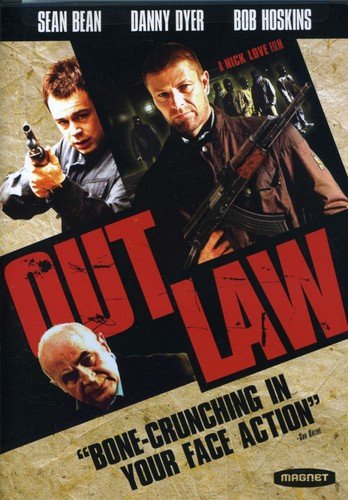
Written by Mule
Outlaw (2007) directed by Nick Love is a British revenge vigilante tale that starts with a disturbing nightmare that involves Gene (Danny Dyer) getting assaulted by a gang of roughians as he is driving to his wedding. This scene sets the tone for what you can expect as the movie progresses. Sean Bean plays the disgruntled ex-soldier Danny Bryant who comes back home and checks into a hotel where the security guard Simon Hillier (Sean Harris) has rigged the rooms with surveillance cameras in order to keep closer watch on the denizens. The hotel’s security office turns into a kind of hub for the guys who will become the vigilante group this story centers on.
They consist of a barrister, Cedric (Lennie James), who’s wife and child have been brutally murdered by the crime boss on trial in his current case; Sandy (Rupert Friend), the son of an army acquaintance of Danny’s who has been the victim of a hate crime; and Gene who gets into a street brawl when he thinks his nightmare is coming true. They also get some additional backing from Walter Lewis (Bob Hoskins) who has been in charge of Cedric’s safety and failed miserably.
The vigilante group feels betrayed by the judicial system and the government and decide to take action themselves. Or, at least that’s the polite version of what’s going on here. The less polite version would be that each character has his reasons to resort to violence and they have very little to do with any kind of social commentary, no matter what ideology gets touted. They’re not the most adept group, and Simon is obviously not a well-adjusted young gentleman. Neither is the ex-para Danny. They’re not particularly successful, either. Actually they get beaten during their first bar brawl and they don’t obtain their main objective, which is to get to the crime boss.
Love claims to have based the plot on stories he’s heard and things he’s experienced and there’s merit in that, of course there is, but the overall problem here is that it doesn’t come together in any kind of consistent plot. It remains disjointed and vague while still relying on some pretty heavy vigilante clichés, which is not a happy marriage of ideas. It does have some strong points, like the bleak, almost dystopian feel of the urban landscape most of the movie is set in and the occasionally glimmer when it comes to character exposition. Sandy is the only one who actually walks away from this story with any kind of hope for a life and he’s the most obviously scarred of them. For some reason his silence intrigued me, and that’s quite a feat in a story as confused as this.
And it is confusion… the thing that mars this and makes it less than it could be. The idea that fighting a vigilante war hinges on shooting one single top dog is laughable. The notion that this particular group could outgun a whole posse of police men is even more risible. The disintegration of the group could have been interesting if there had been any kind of depth to the expression of it, but as things stand you can, at best, see the purpose when it comes to the actual telling of the story – the execution, however, leaves a lot to be desired. There’s no doubt that the actors involved have gone into this with serious intentions, but in the end it is just not enough.